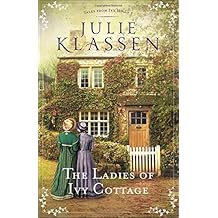

This is my first
visit to Ivy Hill, and I am looking forward to my next visit. Although I
entered this series in book two of the Tales
From Ivy Hill series, it worked quite well as a stand-alone read. I don’t
believe too much was revealed to spoil my going back and reading book one. I am
actually quite intrigued to discover what previously occurred between Jane Bell
and Gabrielle Locke, as well as to learn what motivated the change in Jane’s mother-in-law,
Thora. Klassen does a good job of balancing closure in this book with leaving
enough of the plot line open to motivate her reader to read book three.
Themes in The Ladies of Ivy Cottage deal with the
struggle to ask for help from others, and maybe even from God. While the story
is set in 1820’s England, this struggle may be even more prevalent in today’s
society that values independence, self-reliance, and pulling oneself up by
one’s own bootstraps. The book also deals with the importance of truth: the
sometimes-high cost of truth, the fact that truth always has a way of coming
out, and the strength of character that is displayed when one deals with a hard
truth in a way that pleases and glorifies God. This too is a theme that is
pertinent to modern living as we are daily faced in mainstream media and social
media with discerning truth, holding our leaders to the truth, and behaving
truthfully in our own lives even when the cost may be quite high.
The main
characters in this book are endearing. The three central characters inn keeper
Jane Bell, school teacher Mercy Grove, and librarian Rachel Ashford now all
working for a living were once ladies of nobility. They are evidence of
changing times in England, as are their friendships with secondary characters
that cross social boundaries. Changes, even positive ones, take time to accept
by people of both genders and across all walks of life. This is evidenced by
the reaction and interaction of characters throughout this story, as it is probably
evidenced in each of our own lives.
I recommend The Ladies of Ivy Cottage to historical
fiction fans, they will likely be intrigued by the information on subscription
or circulating libraries, forerunners of today’s public libraries, that is
woven into the story. I also recommend it to fans of romantic fiction, and of
course to those who love Christian fiction. I thank NetGalley and Baker
Publishing Group for providing me with a copy of this book in exchange for an
honest review. I received no monetary compensation.
![The House on Foster Hill by [Wright, Jaime Jo]](https://images-na.ssl-images-amazon.com/images/I/51VZF-8GDyL.jpg)






![The Sound of Rain by [Thomas, Sarah Loudin]](https://images-na.ssl-images-amazon.com/images/I/41O%2B%2BeeNypL.jpg)









![A Dangerous Legacy (An Empire State Novel Book #1) by [Camden, Elizabeth]](https://images-na.ssl-images-amazon.com/images/I/51nfOGHsnNL.jpg)



![All She Left Behind by [Kirkpatrick, Jane]](https://images-na.ssl-images-amazon.com/images/I/511SRCdmiXL.jpg)

![Steal Away Home: Charles Spurgeon and Thomas Johnson, Unlikely Friends on the Passage to Freedom? by [Carter , Matt, Ivey, Aaron]](https://images-na.ssl-images-amazon.com/images/I/51Kk6MzWQ9L.jpg)


![Cherished Mercy (Heart of the Frontier Book #3) by [Peterson, Tracie]](https://images-na.ssl-images-amazon.com/images/I/518NU5-oqHL.jpg)

![These Healing Hills by [Gabhart, Ann H.]](https://images-na.ssl-images-amazon.com/images/I/510da0yrhrL.jpg)

![Justice Buried by [Bradley, Patricia]](https://images-na.ssl-images-amazon.com/images/I/513Pb51eAZL.jpg)

![Up in Smoke by [Conway, Hannah R.]](https://images-na.ssl-images-amazon.com/images/I/41Gwm3BSZFL.jpg)


![Chasing Secrets (Elite Guardians Book #4) by [Eason, Lynette]](https://images-na.ssl-images-amazon.com/images/I/41sfMrNexKL.jpg)

![Fatal Trust by [Johnson, Todd M.]](https://images-na.ssl-images-amazon.com/images/I/412DO4tgHKL.jpg)

![Beneath Copper Falls (Rock Harbor Series) by [Coble, Colleen]](https://images-na.ssl-images-amazon.com/images/I/51r9uExPysL.jpg)

![The Writing Desk by [Hauck, Rachel]](https://images-na.ssl-images-amazon.com/images/I/51-33nuw15L.jpg)

![Beloved Hope (Heart of the Frontier Book #2) by [Peterson, Tracie]](https://images-na.ssl-images-amazon.com/images/I/51gsA-DCamL.jpg)

